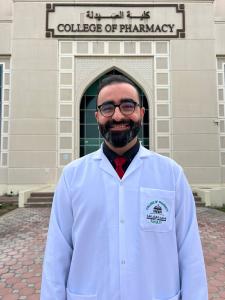
Statin pills could increase survival chances of people with blood cancers, study finds
Statin pills provide patients with some blood cancers better chances to survival the disease.
SHARJAH, EMIRATE OF SHARJAH, UNITED ARAB EMIRATES, April 27, 2025 /EINPresswire.com/ -- People on cholesterol-lowering statins and suffering from certain blood cancers have better survival rate than counterparts going without the medication, a new study in the journal Blood Advances shows. (Original source URL: https://doi.org/10.1182/bloodadvances.2024015287)
“The findings revealed a statistically significant association between statin utilization and improved OS, PFS and cancer-specific survival. The latter suggests a potential disease-modifying effect of statins in this patient population,” the authors write in their conclusion.
The researchers conduct an observational analysis using data from four randomized controlled clinical trials, including 1,467 patients with blood cancers.
They assess the association of statins with lowering the risk of death via three commonly used methods oncologists lean on when observing effects of treatments for metastatic diseases – cancers that spread beyond their primary location to other tissues.
The first, CCS, or cancer specific survival, includes the length of time from cancer diagnosis or start of treatment to the patients’ date of death.
The second, OS, or overall survival, sees how well a treatment works and covers the length of time patients diagnosed with cancer are still alive.
And the third, PFS, or progression-free survival, relates to the length of time during and after the treatment of cancer in which patients live with the disease but their conditions do not get worse.
The clinical trials are sponsored by Janssen Pharmaceuticals (J&J), a Belgian pharmaceutical company headquartered in Beerse, Belgium, and wholly owned by Johnson & Johnson.
Dr. Ahmad Abuhelwa of the University of Sharjah and the project’s leader says the study is the product of intensive collaboration among leading medical institutions like Burjeel Cancer Institute (UAE), Harvard Medical School (USA), H. Lee Moffitt Cancer Center and Research Institute (USA), and Flinders University (Australia).
“We have found that patients with chronic lymphocytic leukemia (CLL) and small lymphocytic lymphoma (SLL) who were taking statins at the initiation of their cancer treatment had better survival outcomes compared to those who were not on these medications,” confirms Dr. Abuhelwa.
CLL is the most common type of leukemia in adults, making up about one in three new leukemia cases in the U.S. It is a slow-growing cancer where the body makes too many abnormal white blood cells. SLL is essentially the same disease as CLL, but it shows up mainly in the lymph nodes rather than the blood and bone marrow.
“The data showed that statin use was linked to longer overall survival, slower disease progression, and lower cancer-specific mortality,” maintains Dr. Abuhelwa. “These associations remained significant regardless of patients' age, sex, physical functioning (as assessed by doctors), disease severity, length of time since diagnosis, comorbidities, and the use of other cardiovascular medications. Importantly, statins did not increase the risk of severe side effects.”
The relationship between statins and cancer survival is not new and it has been debated for years. However, Dr. Abuhelwa credits the study with gathering “strong new evidence that supports further research into whether statins could play a role in improving outcomes for leukemia and lymphoma patients."
“While our study cannot confirm a causal relationship, the findings suggest that statins may offer benefits beyond cardiovascular protection,” he said. “Further research is warranted before statins can be formally incorporated into standard treatment protocols for CLL and SLL.
“If future research confirms their benefit, statins could become an easy and cost-effective way to improve survival in leukemia and lymphoma patients.”
Co-author Dr. Ashley Hopkins, from Australia’s Flinders University, explains, “Repurposing commonly used medications for cancer treatment is an exciting field. Our study highlights the need to explore whether statins could serve as an additional strategy in leukemia and lymphoma care."
The study presents promising observations that could be good news for patients on statin and the pharma manufacturing the medication. Statin use was linked to a 61% lower risk of cancer-specific death, a 45% lower risk of death from any cause and a 27% lower risk of disease progression.
These potential benefits are observed regardless of patients’ specific age, sex, physical functioning (as assessed by doctors), disease severity, length of time since diagnosis, comorbidities, and the use of other cardiovascular medications.
Co-author and CEO of UAE’s Burjeel Cancer Institute, Prof. Humaid Al-Shamsi, says, “As oncologists, we are constantly looking for safe and effective ways to improve survival. This study raises an exciting possibility—that a well-known and widely used medication like statins might enhance cancer outcomes without introducing additional risk”.
The significance of the study is two-pronged. First, leukemia and lymphoma are among the most common blood cancers. Second, statins are affordable and widely available, making it possible for the medication to emerge as a new drug to improve outcomes in leukemia-related cancers.
“This is one of the largest studies to date on statin use in patients with CLL and SLL,” said Dr. Abuhelwa. “Because we utilized clinical trial data, our findings are particularly relevant to current treatment strategies. Our study lays the groundwork for future research that could ultimately change how we treat blood cancers.”
LEON BARKHO
University Of Sharjah
+971 50 165 4376
email us here
Distribution channels: Companies, Healthcare & Pharmaceuticals Industry, Science, Technology, World & Regional
Legal Disclaimer:
EIN Presswire provides this news content "as is" without warranty of any kind. We do not accept any responsibility or liability for the accuracy, content, images, videos, licenses, completeness, legality, or reliability of the information contained in this article. If you have any complaints or copyright issues related to this article, kindly contact the author above.
Submit your press release
